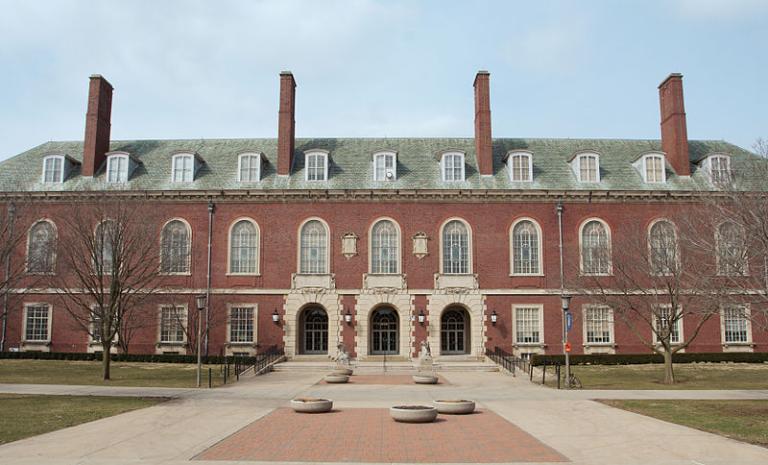![https://commons.wikimedia.org/wiki/File%3AHarvard_Yard%2C_Harvard_University.JPG; By Daderot. (Own work) [GFDL (http://www.gnu.org/copyleft/fdl.html) or CC-BY-SA-3.0 (http://creativecommons.org/licenses/by-sa/3.0/)], via Wikimedia Commons](https://wp-media.patheos.com/blogs/sites/533/2017/08/800px-Harvard_Yard_Harvard_University.jpg)
So last week I wrote a little blogpost expressing my irritation at the Chicken Little reporting over a provision in the House tax bill, which would remove the exemption/”loophole” in which, at present, grad student-employees are exempt from paying taxes on the tuition waivers they receive that are conditioned on that employment. No, it will not destroy higher education, I wrote, since universities can either remove the work requirement from the tuition waiver, or can gross up the stipend accordingly.
After another such article in the New York Times on Thursday, I fired out a tweet griping about these claims that the change in the provision would “bankrupt graduate students.” And this time I got a number of replies.
Some of them just didn’t get what I was trying to say. “If universities no longer condition the tuition waivers on employment, they wouldn’t be able to get grad students to do the teaching and lab work upon which they depend.” Um, no. It seems preposterous to imagine that any more than a small number of grad students would turn down the stipend, so as long as that’s conditioned on employment — and that’s taxable anyway so it’s not a change — there won’t be any significant impact in that respect. In the sciences, the “employment” is part and parcel of their research towards their doctorate, so it simply wouldn’t have any effect. In the humanities, surely it’s still the norm that grad students at least have the hope of pursuing a teaching career, so that teaching assistantships are a key part of their training, and they wouldn’t be willing to forgo the teaching, presuming that it’s not too burdensome. My experience is now many years in the past, and was, after all, at only one university, but I would guess that it’s generally the case that the stipend is a “good deal” and, even without considering the tuition waiver element, is still more pay for fewer working hours, relative to any other job that a grad student might find that would accommodate their studies. Maybe there would be humanities grad students who didn’t need an income, for whatever reason (spousal support, independently wealthy) and wanted to focus exclusively on their studies without the distraction of teaching. But I don’t see how that would necessarily be a problem, as I suspect that, again even considering only the cost of the stipend, a university could likely hire a full-time instructor for the equivalent of two or three grad student stipends (assuming that a grad student TA works half- or one-thirds-time), and probably provide more value for their students.
But the replies in my twitter feed did point out three relevant complications.
In the first place, in the sciences, it is grants that pay for grad student stipends, and those same grants also pay for the tuition waivers. For those universities to now declare that the tuition waivers are unconditional would mean that there would be accounting/compliance issues, if grant money is paying universities for something that is now no longer connected up to the content of the grant. Which means that those grants would have to be reduced in value, and universities would lose real money. On the other hand, those grants could include both employment-conditional tuition waivers and a tax gross-up, but this can’t just happen overnight, and it would mean that the grants would be more costly. Given that (so far as I understand) grants generally originate from the government (e.g., the NSF, NIH, etc.), it seems perhaps correct from an accounting point of view but an unnecessary complication for the government to pay out money that just gets paid back in taxes. (Though, on the other hand, one could say that this is exactly the same as any government employee being obliged to pay taxes like other citizens.)
In the second place, in the humanities, and to the extent that grad students in the sciences “earn their keep” not by research but by teaching/TAing, it upends what is at the very least a convenient fiction that tuition waivers are compensation for grad student work. After all, if universities had to deem graduate student scholarships as entirely unconditional, they’d face criticism for their generosity in handing these out. Public universities in particular might come under criticism from state legislatures, depending on how closely they scrutinize their spending.
Perhaps this would factor into universities’ decisions about building out humanities graduate education, if they were unable to maintain the fiction that they earned their out-of-state tuition by teaching, and had to acknowledge that the objective of a graduate department is not to “pay for itself” but to make the professors happier and boost prestige. And don’t get me started on what I think of claims being made that all sorts of wonderful career opportunities await individuals with graduate degrees in the humanities. I think it’s done a lot of harm that young adults are now being told that a master’s degree is a near-requirement for all manner of employment in which it objectively isn’t. After all, there are a lot of ways to acquire the writing skills and the “advanced knowledge” and touted wisdom of these graduates that cost less money — among them, life experience, and experience on the job itself.
But the point is, if this loophole had never been there, the system would have developed differently, which means that, regardless of what’s “right” or “wrong” in terms of how universities and taxes should work, there are legitimate issues around a transition, particularly with the apparent last-minute nature of the whole bill — for the federal government to make changes to the tax code which would, near as I can tell, take effect almost immediately, is moronic.
And some twitter-repliers reasonably asked, “why is all of this being put into place at all?”
With respect to changes in how universities manage their endowments, I quite honestly haven’t dug into this enough to know whether the law removes loopholes, so that university endowments are treated the same as an endowment or foundation connected to a hospital, say, or an independent foundation, or whether universities are being singled out because they’ve pissed off too many GOP lawmakers.
With respect to this legislative change, I simply don’t know whether lawmakers wanted to be “purists” and remove all loopholes, and make everyone play by the same rules, whether in the end it gets them more money or not, or whether this change is a by-product of a separate change that is intended to garner more revenue, or if, again, this is an intentional “stick it to the Ivory Tower.” After all, the principle of the change is reasonable — bartering and payments in kind are taxable. If I offer up my actuarial skills to a university and ask, in exchange for teaching a course on pension accounting, to be able to take a class on public policy tuition-free, that’s clearly compensation.
And, yes, if I were a professional blogger, rather than writing in the snatches of time before I start work in the morning, or at lunch, or at the end of the day, I might have had access to the sorts of information that would answer that question.
But the Chicken Little approach that universities have taken really gets my dander up. It’s just so frickin’ unproductive, because you can’t talk anymore, if no provision of the tax code can ever be changed for anyone.
And, yes, I promised a more general post on the tax bill, and I still haven’t gotten around to it.
Image: https://commons.wikimedia.org/wiki/File%3AHarvard_Yard%2C_Harvard_University.JPG; By Daderot. (Own work) [GFDL (http://www.gnu.org/copyleft/fdl.html) or CC-BY-SA-3.0 (http://creativecommons.org/licenses/by-sa/3.0/)], via Wikimedia Commons













